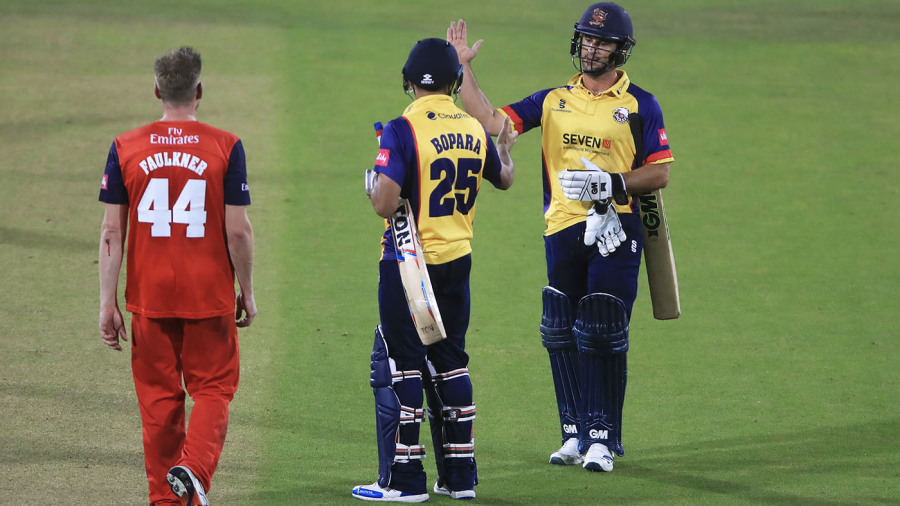Essex 165 for 4 (ten Doeschate 45*, Delport 44, Bopara 39* beat Lancashire 159 for 5 (Davies 80*, Bopara 2-28) by 6 wickets
This was one of the great county cricket fixture shambles of all time. Lancashire forced to play a home Vitality Blast quarter-final on a neutral ground because of a clash with the Old Trafford Test.
Not that it will overly concern Essex. They became the first county to qualify for Finals Day, driven there by Ravi Bopara, their reluctant No 6, who nevertheless fulfilled the role to perfection with an unbeaten 39 from 18 balls, leaving four balls in hand when Essex got home by six wickets.
Lancashire’s 159 for 5 was the highest score made at Chester-le-Street this season. They handled the vagaries of the ground with aplomb. As so often with T20 pitches in county cricket’s most northerly outpost, batting was an endurance Test. The pitch was slow and low, the boundaries were far flung and the ball bit into the surface as certainly as a chill northern wind bit into the couple of thousand hardy souls who had made the trip.
But Essex’s captain Simon Harmer had jettisoned their normal preference for batting first in the hope that dew would quicken the surface later in the evening; he was rewarded not as much by dew as by several bursts of heavy drizzle which sharpened the surface slightly and hindered Lancashire’s spinners. “The conditions might have changed a little bit,” Harmer conceded.
With 23 needed from two overs, Lancashire’s captain, Dane Vilas opted for the leg spin of Liam Livingstone, ahead both of Matty Parkinson, the joint leading wicket-taker in the tournament this season, and the pace of Saqib Mahmood, who had bowled two overs for 10.
“I didn’t know which way to go,” Vilas admitted. If the decision was influenced by a preference for a staunch character in a pressure situation (not that the other two aren’t), it backfired. Bopara pulled the second ball for six and, next ball, cleared the ropes again as Steven Croft overran the ball at long on and deflected it for six. Ryan ten Doeschate was missed at long off, fifth ball, by James Faulkner, who barely laid a hand on it. A third six to finish, over long-on, and Livingstone had disappeared for 22.
Essex had earlier lost the bludgeoning Cameron Delport at long off for 44 and Adam Wheater, run out by a direct hit by Josh Bohannan from deep square leg. A brilliant diving catch by Faulkner at long off left Bopara facing 61 from 34 and, with ten Doeschate, he found his long game in the nick of time.
Perhaps it was always destined to end this way: with Lancashire the victims. Once the fixture clash was apparent, they were up against it, especially as TV coverage demanded an evening match under lights, so ruling out outgrounds such as Liverpool.
And that fixture clash was apparent many months before the start of the season. The fact that the potential for such a fixture oddity in county cricket’s most popular format was not intercepted and remedied when the draft fixtures were published late last year, and was not publically rejected by Lancashire from the outset, was a betrayal of the status of county cricket.
Lancashire’s provision of three free supporters’ coaches was a gesture, but a hollow one. The North Group winners, and a county that has enjoyed the biggest growth in T20 crowds in the country, this summer could not deliver the match that mattered most of all: a last-eight tie on its home turf. Excuses about a particularly crowded fixture list are unacceptable. Talk about the obvious need to prioritise the Ashes is just a side issue.
Midway through the match, it appeared as if Alex Davies would appease their supporters with victory. He batted through the Lancashire innings in imperturbable fashion for 80 from 55 balls, a judicious fourth-wicket stand of 89 in 68 balls with Vilas, as calm a batting partner as you could wish to have, setting up the victory. Davies recognised immediately that this was not a night to thrash through the line, but to deflect, to run hard and gather what he could.
Of Davies’ nine boundaries, eight were on the off-side, most of them wristily angled square or behind the wicket, rounded off by two little ramps on both sides of the wicketkeeper against Aaron Beard. With patience and perseverance, Davies eked out what he could when he could, a dapper cricketer cutting his cloth.
When Lancashire were 47 for 3 after 6.4 overs, they were under pressure. Livingstone’s leg-side swing and miss was a reminder to Davies of the challenges to follow, as was Croft’s drag to long-on off Bopara which dyed many metres in front of the boundary. Even more disturbing was the near-shooter from Bopara which had Maxwell lbw – all deterrents that Davies immediately logged away.
During a rain stoppage, the TV cameras caught Glen Chapple, Lancashire’s coach, staring blank-eyed into the distance, a picture of misery. And he was born in Skipton where it has been known to rain occasionally. Nothing captured Lancashire’s night so well.
The cross-your-fingers-and-hope-for-the-best approach to the staging of a big night in the county calendar defied belief. Here was the arrogance of administrators who still regard T20 cricket as an entertainment, as a money-raiser rather than a sporting competition with intrinsic importance. Here was yet another example of the ECB’s shameful undermining of the county game that has underpinned professional cricket in this country for more than a century.
